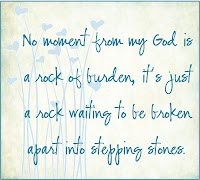
Thursday's Therapy
It's Not Just About Losing Your Child ~
It's Also Very Much About Coping with a Traumatized Self and Your Inability to Function
People hear the words "Child-Loss Grief" and think that such grief is just about losing and missing your child. Well, losing and missing your child is indeed a large enough component to knock us off our feet for a long, long time. But what people DON'T GET is that Child-Loss Grief is also about TRAUMA and what that does to minds, bodies, and psyche's that ALSO turns us upside down and changes our lives forever.
In our observations and own experience, we find that after about two years of contending with child-loss, the wear-and-tear that the stress hormones (e.g., cortisol, epinephrine, and norepinephrine) have had on your body and psyche sets you up for Post-Traumatic Stress, which compounds your ability to walk through your grief, adding a traumatized self to the mix.
For example, over time, you will find that any prior unresolved trauma issues, prior attachment issues (e.g., fears of abandonment, etc.), and prior resolved trauma issues even can get retriggered, or even triggered for the first time. And because our brains have been damaged through being traumatized, we are essentially stuck many times in the fight-flight-or-freeze state which emanates from the part of the brain that is primitive, and provides only for our self-protection which will override logic and reasoning because it perceives that there is an imminent threat for the body to prepare for. Then we find ourselves in such a reactionary mode to where sometimes even we don't recognize ourselves.
Child-Loss Trauma then throws us into a domino-effect of losses upon losses that complicate our lives to the point of feeling almost, if not completely, dysfunctional.
Some of the Components of Child-Loss Trauma are as follows:
Physically
Look at what happens physiologically to the brain from the severe trauma of losing our child. Such trauma essentially results in literal brain damage, as they can now measure through neuroimaging (if they have a "before" and "after" scan) how the hippocampus of the brain (which controls memory) even shrinks.
- Memory is impaired. Our procedural memory (habits or procedures we normally do such as grooming, brushing teeth, locking doors, how we get to stores to run errands, how we find our cars in the parking lots once we're done shopping, etc.) is impaired so that we find our daily functioning is greatly impaired. Thus it feels like we are trudging through molasses to do something we used to do without even thinking about it.
- Concentration is impaired. We may be unable to watch a movie or read a book for awhile once our child is gone. Another child of ours may tell us some important detail in their lives, and we may not register what they say even though we heard them say it.
- Judgment is impaired.
- Hypervigilance occurs.
- Hyperstartle response occurs.
- Hyperarousal occurs (where we stay in a startle-state mode).
- Neural pathways that were there before the death of our child have been disrupted and thus you must help your brain find new ways to re-route critical information to the different parts of the brain (such as the medial pre-frontal cortex) to be reprocessed and resolved. In effect, you are stuck in fight-flight-or -freeze state until you can help your brain move that sensory data or information to the appropriate places in the brain for it to be processed and resolved.
Emotionally
- Besides missing our child, we have lost the future with our child.
- We have lost the family "nest" of the intact-family-unit we always had, and thought we always would have.
- We have lost the celebrations of birthdays, holidays, and other family or community rituals that brought us much happiness.
- Relationships with others whether friends, church members, or even family members are often lost as the chasm between us widens when they cannot understand, respect, or appreciate the devastation that comes with our immense loss.
Mentally
- We have lost many assumptive beliefs, such as the belief that the world is a predictable place.
- We have lost the assumptive belief that the world is a safe place.
- We have lost a sense of security.
- We must now live through the rest of our lives knowing with a surety that death can happen to anyone we love in just a moment's time.
Spiritually
- Many of us have lost trust in God who did not protect us or our child at a critical time in our lives.
- Most of us have to re-examine our faith to embrace the truths, and throw out the falsehoods that inadvertently crept in and tainted our view of God.
- Many have difficulty returning to places of worship when there are so many volatile emotions, or confused feelings about God, or angst over trite sayings that wound instead of comfort.
- Some of us have experienced abandonment from the very people we would have thought would stick by us through thick-and-thin because of their purported life-values, which leads to painful secondary injuries we must add on to our traumatic grief to work through and heal from.
Career-wise
- We may find that we cannot automatically perform the very work we had done all our adult-lives before our child's death.
- We may find we have lost the confidence we once had to perform our job.
- We may find we do not have the emotional stamina to do the work we once did.
- We may find that we have a fatalistic attitude that impairs us doing our work, e.g., if we couldn't keep our child from danger who was the center of our attention, why should we think we will have success with anything else?
- We may find that we are impaired in our work due to emotional triggering that interferes with our functioning normally.
Medically
- Immune systems can become compromised.
- Our bodies can succumb to diseases they once easily fought off, e.g. diseases such as cancer, high blood pressure, heart disease, and diabetes.
- There is a much higher incidence of developing addictions or of triggering old addictions to illegal substances, alcohol, prescription medicines, sex, eating disorders, etc.
- There is a much higher incidence of being accident prone.
- There is a high incidence of insomnia and/or nightmares.
We find that we are not only left in this life to grieve our child, but it's almost as if everything is up for grabs, and there is a need for redefining everything including self, others, and God. So Child-Loss Grief is not just about losing our child; it is also very much about coping with a traumatized self and an inability to function.











































1 comment:
Post a Comment